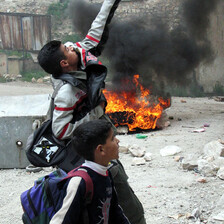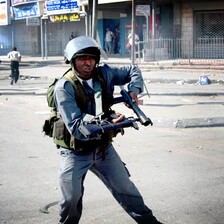Tel Aviv 21 October 2003

Attorney Dov Khenin and Matan Kaminer in Matan’s first court hearing (Photo: Refuser Solidarity Network, 2003)
TEL AVIV - A few minutes before the beginning of the solidarity vigil on the afternoon of Sunday Oct, 19, somebody came up with a new slogan: “Conscience in Prison, Stupidity in Power!” Blank placards were drawn up on the sidewalk opposite the Defense Ministry gate, and the new slogan joined old favorites such as “Down With The Occupation!” and “Occupation Is Terror - the Refuser is a Hero!” Some 150 people had come to express solidarity with the imprisoned refusniks, now entering the last stages of the year-long ordeal at the Jaffa Military Court. Old and young were there, past and present refusers, parents and friends and sympathizers. The youngsters were singing the unofficial anthem: “No thank you Mr Sharon / Go yourself to Hebron / Damn your schemes, all to hell / Off we go to prison cell!”
On the following morning, all who could afford to miss a working day crowded into the narrow hall at the court. KM Issam Mahoul was there, as well as a couple of “ecumenical accompaniers” from the World Council of Churches and several representatives of the international press. As on previous sessions, the five youngsters got prolonged applause as they filed in and took their places at the dock. The equally young military police accompanying them seemed quite friendly disposed.
Today, the cross-examination of Shimri Tzameret, Adam Maor, and Noam Bahat was scheduled, the other two - Chaggai Matar and Matan Kaminer had theirs already in September. The prosecutor, Captain Yaron Costelitz, had managed to prepare himself by obtaining a considerable number of leaflets and press releases by the various refuser movements, as well as the full text of Shimri’s “prison blog”, new installments of which appear every week on the Israeli Walla news website, trying to rattle the young COs with a flood of quotations. “So you think the war is not really necessary, do you? That the government could have ended it easily enough by just withdrawing? So you know better than all the generals, and all the decisionmakers, on the basis of the enormous experience and knowledge you gathered in your 19 years of life?”
The youngsters stood their ground. “I did not take the decision to refuse in one day. I pondered for years what I was going to do. I read a lot of material and spoke with many people and had sleepless nights of thinking and debating with myself. I came to the conclusion that the army’s acts in the Occupied Territories are flagrantly immoral and violating international law”, said Shimri Tzameret. “Violating international law? We seem to have here an eminent jurist, also! Don’t you know that the Supreme Court ruled all these actions to be justified and necessary for saving lives?” “That is not true; in some cases the Supreme Court forbade things which were being done for years. For example the torture of Palestinian prisoners.”
“But if the Supreme Court rules that your refusal is totally illegal, would you persist in it? Would you undermine the rule of law that much?” “You are an observant Jew. Would you obey the Supreme Court if it ruled that you must eat ham?”
Adam Maor was subjected to prolonged questioning about the letter which the refusers signed last June, calling from the military prison upon Palestinians to avoid attacks on civilian targets, and which was published widely in both Israeli and Palestinian press. “You wrote specifically asking your Palestinian friends to avoid killing civilians. Does that mean that you approve of the killing of soldiers?” Tense silence in the court. Everybody had seen the morning headlines telling of three soldiers ambushed and killed in a West Bank village. “I am very much against killing in general, of civilians or soldiers. In that letter we specifically mentioned other courses of action Palestinians may take, such as mass demonstrations, hunger strikes or the dismantling of army roadblocks. Still I must say, if a foreign army was occupying Haifa where I live, if roadblocks were depriving all of us of the most elementary freedom of movement, if we had grown up seeing our fathers being humiliated by the foreign soldiers - frankly, I don’t know how we would have behaved.”
Later, Costelitz tried to dig into the meanings of the Highschool Letter which the five together with some 300 others had signed. “When you write: ‘We call upon all those soon to be conscripted to do as we do’ does that mean that you call upon all of them to refuse military service?” Before defense attorney Smadar Ben-Nathan could voice an objection, the presiding judge, Lieutenant Colonel Avi Levi sternly reprimanded the prosecutor: “Before asking such .a question, it i your duty to warn the accused that his answer may implicate him in more serious charges than those he faces in this court, namely Incitement to Mutiny.” Throughout the trial, Colonel Levy seemed to act in an eminently fair way, which is of course no guarantee for the final outcome.
When it came the turn of Noam Bahat, Costelitz produced a thick file of Bahat’s correspondence with the military authorities. “I have here the letter which you wrote to the army at the age of 17, and another letter from half a year later, and also a letter which your parents wrote to the army on your behalf at the same time. None of them mentions a principled objection to military service. In fact, the only request you made at that time was not to go to a combat unit. You have come quite a long way since, isn’t it?” - “If you read these letters you must know that at that time I contemplated joining the army’s Educational Corps and helping those soldiers who come to the army with lack of basic education, some of them actually illiterate. Since I have already some educational experience and that is what I want to do in life, I thought that would be the most useful thing I can do. But gradually I realized that the education which the army provides to such people is short and superficial, and its main purpose i still to make them into ‘usefull parts of the military’. Also, while I had this correspondence I heard from friends who already went into the army what is really going on in the territories. For example, the practice of forcing Palestinians to be human shields when soldiers are besieging suspected terrorists and force
their neighbors to go first into the building, and thus sometimes get killed.
Later it was very much in the news. But I had already heard about it first-hand from friends. I decided I could not be part of a body which does such things. I am still very much willing to do educational work, as a service to the society, but in a civilian framework.”
“In January you had a hunger strike in your cell. I have here the press release where you are quoted as saying that you are persecuted for your opinions. Is that really what you said? Persecuted for opinions - not for disobeying legal orders?” - “Yes, indeed! That’s what I said then, and that is what I say now. I and the rest of us are suffering for our opinions. There is in the army a procedure that a soldier who persists in making trouble upon enlistment is sent three times to a month in prison, and after ninety days or so gets to the Incompatibilty Committee which throws him out of the army. I know somebody who went to the Induction Center on the same day I did and he refused without giving any political or ideological reason. He is already out for more than half a year. Later I talked with an officer at the Induction Center, who told me that is really the procedure but that there is an order not to apply it to principled refusers. So, yes, we are here in this court not because of our disobedience but because of our opinions.”
With this day-long session a long-drawn out process of testimonies and cross-examinations came to an end. The next session, on November 4, will be devoted to the final summations of prosecution and defence, after which the final verdict should not be too long in coming. Still before that is expected the verdict in the separate trial of the “unrecognized pacifist” Yoni Ben-Artzi. The army’s official doctrine is that, while an objector to the occupation is ineligible for exemption a true pacifist could go free.
Meanwhile, on the day of the trial, a new refuser was reported to have embarked that morning on the long and weary way of confronting the military system. Three other draft resisters are still trapped in the limbo of going in and out of ever renewed monthly prison terms, while four reservists are presently incarcerated for refusing service in the occupied territories.
Adam Keller wrote this report for the Refusenik Parents Group. Contact persons: Smadar Nehab (email: snehab@netvision.net.il); Anat Matar (email: matar@post.tau.ac.il); Reuven Kaminer (email: mssourk@mscc.huji.ac.il.



